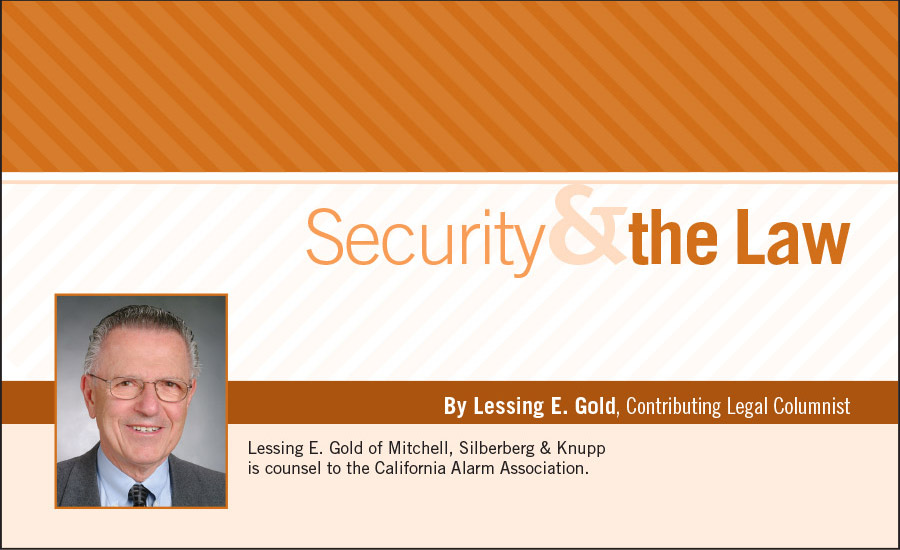A suit was recently filed in the United States District Court for the Eastern District of Texas accusing a number of alarm companies of infringing on a patent described as “303 patent.” The cases were each consolidated. The defendant alarm companies filed a motion to dismiss for failure to state a claim. The matter was assigned to a magistrate judge.
The patent referred to as 303 Patent related to a home security network system. The patent consisted of six claims, all of which were system claims. The defendants contended that the patent encompassed only an abstract idea of detecting an alarm and sending a corresponding message about that alarm to a third party through an intermediary that is not tethered to any specific machine or limited in a way that would make them patent-eligible.
The Magistrate Judge pointed out that Section 101 of the Patent Act defines what is eligible for patent’s protection. Pursuant to 35 USC §101, “Whoever invents or discovers any new and useful process, machine, manufacture, or composition of matter, or any new and useful improvement therefore may obtain a patent subject to the conditions and requirements of this title.”
The statute contains a long recognized implicit exception for laws of nature, natural phenomena and abstract ideas, which are not patentable. Citing a number of cases, the court pointed out that when considering whether a patent describes patentable material, the courts must strike the balance between protecting inventors and not granting monopolies over procedures that others would discover by independent, creative application of general principles.
Referring to previous cases, the court pointed out that it utilizes a two-part test for distinguishing patents that claim laws of nature, natural phenomenon and abstract ideas from those that claim patent-eligible applications of those concepts. First the court considers whether the patent’s claims are directed to one of the patent-ineligible exceptions such as laws of nature, natural phenomena, or abstract idea. Second, if the court finds that the claims are directed to an ineligible concept, the court must examine the elements of the claim to determine whether it contains an “inventive concept” sufficient to transform the claimed abstract idea into a patent-eligible application.
The defendants stated that the claims in the 303 Patent fail at both the “ineligible concept” step and the “inventive concept” step. The defendants describe the patent as a computer-implemented system to (1) monitor security devices; (2) contact an intermediary over a conventional telephone network when a device is triggered; and (3) forward a corresponding signal over a conventional telephone network to appropriate entities. The defendants contended that the functions performed by the claimed system are simply routing a message to the appropriate parties when a security device in a home is triggered — functional features that could easily be performed by a human.
The plaintiff argued, among other things, that the defendants improperly construed several terms, including a “remotely located administrating and monitored device,” claiming that the specification of the 303 Patent described a particular embodiment of a remotely located administrating and monitoring device. The parties submitted a Joint Claim Construction Chart that showed that the term “a remotely located administrating and monitoring device for receiving the first alarm signal and for generating a second alarm signal” is in dispute.
The Magistrate Judge ruled that the defendants failed to adequately demonstrate the absence of fact and claim construction issues, further pointing out that the claim construction hearing was currently scheduled for a later date and that hearing would provide the court a more complete understanding of the claimed invention. The Judge stated that the court will consider claim construction and the motion for summary judgment of the indefiniteness at that hearing. Therefore, the magistrate judge indicated that the motions to dismiss should be denied.
The United States District Court adopted the findings and conclusions of the magistrate judge and therefore also denied the motions to dismiss without prejudice. As to several other defendants, the motions were dismissed with prejudice.
Readers Ask
We are an alarm company providing primary residential services, which is very competitive. When our sales people sign a contract, because of the competitive market, we would like to install the system, or at least commence installation of the system, immediately upon the signing of the contract. Can we do this? What are the consequences?
To read the answer, go to SDMmag.com. Click the Columns tab and select Security & the Law.
ANSWER
Under the law, if you enter into an agreement to install a residential system at other than the residential subscriber’s business premises, the subscriber has the right to rescind the contract at any time within 72 hours from the date the contract was signed. If you install the system prior to the expiration of the 72 hours, you do it at your own risk. If the subscriber rescinds the contract within the 72 hours, then you have to remove the system, restore the premises to its original condition and return any funds which were paid to you by the subscriber. In an emergency situation, if the subscriber insists that you install the system, then you should get a written agreement from the subscriber whereby the emergency is set out and the subscriber agrees to waive the requirement of the 72 hour notice of his or her right to rescind. This is not recommended unless it is a real emergency situation. Notwithstanding, you must still give the subscriber the required 72 hour notice of the right to rescind.



